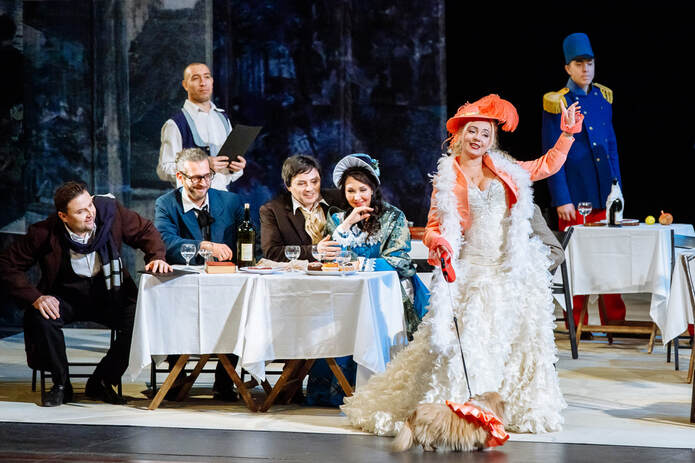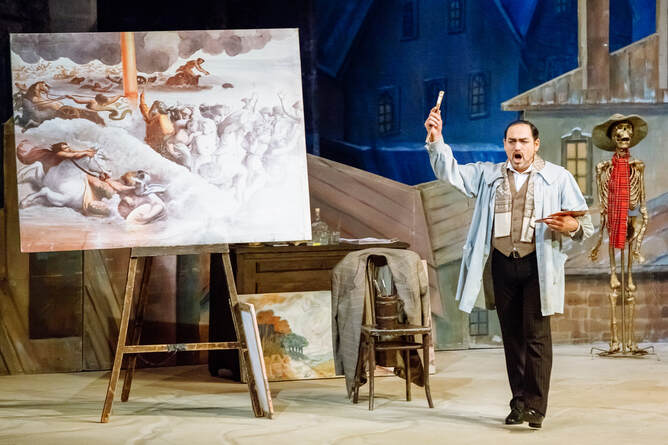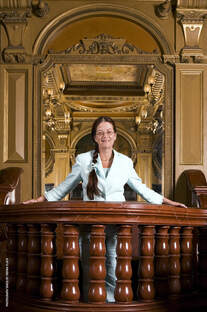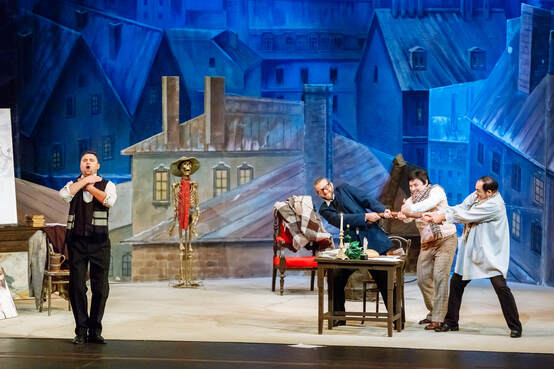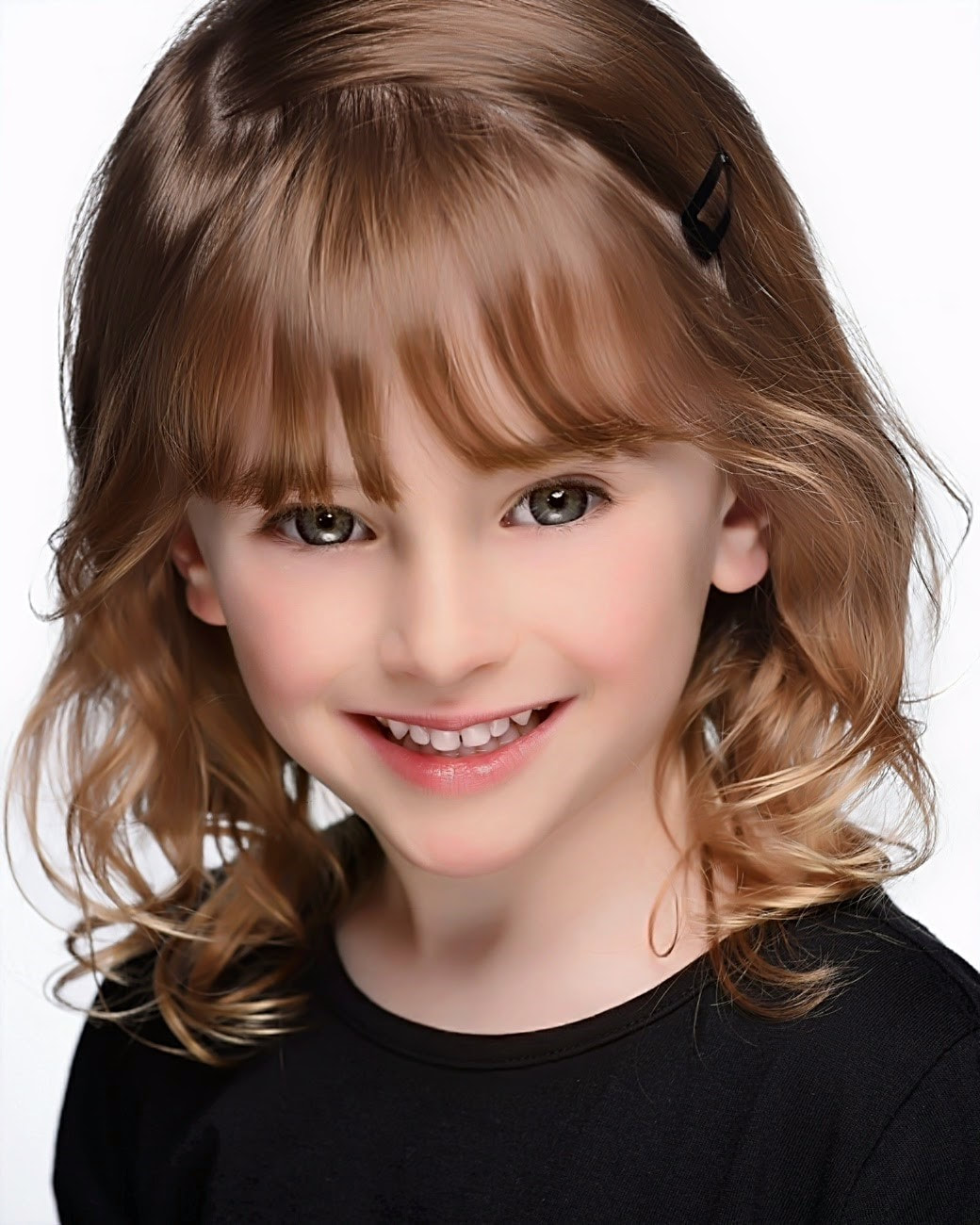LA BOHÈME
CLIFFS PAVILION, WESTCLIFF ON SEA
18 FEBRUARY 2020
CLIFFS PAVILION, WESTCLIFF ON SEA
18 FEBRUARY 2020
Award-winning opera producer Ellen Kent brings one of the most romantic operas ever written La Bohème to the Cliffs Pavilion on 18 February in her new tour, traditionally staged featuring beautiful sets and costumes. Set in the backstreets and attics of Bohemian Paris, this powerful and emotional opera tells the heart-breaking tale of the doomed, consumptive Mimi and her love for a penniless writer, Rodolfo. Puccini’s masterpiece, La Bohème, is based on Henri Murger’s novel Scenes de la vie de boheme.
The sumptuous set is inspired by the art of the Bohemian period, particularly Chagall and Renoir. The set reflects the Bohemian art of the period and the authentic costumes will transport you immediately to Bohemian Paris. The production includes a brass band, snow effects and Musetta’s adorable dog will also make an entrance.
The powerful and emotional La Bohème is the tragic tale of doomed romance between consumptive seamstress Mimi and penniless writer Rodolfo. After falling instantly in love, Rodolfo later leaves Mimi due to her flirtatious behaviour, though he is wracked with guilts since their life together has surely worsened Mimi’s delicate constitution. In true tragic opera fashion the pair reunite briefly at the end before Mimi dies. This classic story of Parisian love and loss features many famous arias including ‘Your Tiny Hand is Frozen’, ‘They Call Me Mimi’ and ‘Musetta’s Waltz’.
Ellen said “The scene where Mimi and Rodolfo meet and she sings They call me Mimi always makes me cry. It’s such a beautiful piece of music. I try to do opera that the audience can emotionally connect with, not just on a musical level but with the personal drama happening on stage”.
Ellen’s production of the extreme poverty in the backstreets and attics of Paris was inspired by reading George Orwell’s book Down and out in Paris.
Elena Dee will share the role of Mimi with celebrated international soprano Alyona Kistenyova and Marina Tonina is taking the role of Musetta. The production also boasts a full orchestra and chorus.
Elena Dee, an international Korean soprano, returns to delight us with her poignant and emotional rendition of Mimi in La Bohème. She was spotted by Ellen Kent when she was working under the musical direction of the great Moldovan baritone, Vladimir Dragos. She was a talented classical pianist but was hoping to become a soprano. Ellen auditioned her and suggested she came back when she had acquired more experience vocally. Ellen auditioned Elena again some years later and the rest is history. She went on to sing Aida, Tosca, Mimi and Madama Butterfly in Ellen’s productions. Her portrayals of these roles were stunning both musically and dramatically.
Alyona Kistenyova, the international soprano from Odessa National Opera will be returning after her critically acclaimed performances in Aida, La Boheme, Carmen, Tosca and Die Fledermaus, Rigoletto, La Traviata and Madama Butterfly. Alyona will be singing Mimi in La Bohème alternating with Elena Dee.
The sumptuous set is inspired by the art of the Bohemian period, particularly Chagall and Renoir. The set reflects the Bohemian art of the period and the authentic costumes will transport you immediately to Bohemian Paris. The production includes a brass band, snow effects and Musetta’s adorable dog will also make an entrance.
The powerful and emotional La Bohème is the tragic tale of doomed romance between consumptive seamstress Mimi and penniless writer Rodolfo. After falling instantly in love, Rodolfo later leaves Mimi due to her flirtatious behaviour, though he is wracked with guilts since their life together has surely worsened Mimi’s delicate constitution. In true tragic opera fashion the pair reunite briefly at the end before Mimi dies. This classic story of Parisian love and loss features many famous arias including ‘Your Tiny Hand is Frozen’, ‘They Call Me Mimi’ and ‘Musetta’s Waltz’.
Ellen said “The scene where Mimi and Rodolfo meet and she sings They call me Mimi always makes me cry. It’s such a beautiful piece of music. I try to do opera that the audience can emotionally connect with, not just on a musical level but with the personal drama happening on stage”.
Ellen’s production of the extreme poverty in the backstreets and attics of Paris was inspired by reading George Orwell’s book Down and out in Paris.
Elena Dee will share the role of Mimi with celebrated international soprano Alyona Kistenyova and Marina Tonina is taking the role of Musetta. The production also boasts a full orchestra and chorus.
Elena Dee, an international Korean soprano, returns to delight us with her poignant and emotional rendition of Mimi in La Bohème. She was spotted by Ellen Kent when she was working under the musical direction of the great Moldovan baritone, Vladimir Dragos. She was a talented classical pianist but was hoping to become a soprano. Ellen auditioned her and suggested she came back when she had acquired more experience vocally. Ellen auditioned Elena again some years later and the rest is history. She went on to sing Aida, Tosca, Mimi and Madama Butterfly in Ellen’s productions. Her portrayals of these roles were stunning both musically and dramatically.
Alyona Kistenyova, the international soprano from Odessa National Opera will be returning after her critically acclaimed performances in Aida, La Boheme, Carmen, Tosca and Die Fledermaus, Rigoletto, La Traviata and Madama Butterfly. Alyona will be singing Mimi in La Bohème alternating with Elena Dee.
Maria Tonina is one of the best sopranos to tour in Britain for Ellen Kent. Her operatic talent won her a scholarship to the Vienna State Opera House where she worked with Ileana Cotrubas and KS Olivera Miljakovic. In contrast to our dark, sultry sopranos Elena Dee and Alyona Kistenyova, Maria shines as a blonde belle on stage. She has sung in Rigoletto, Die Fledermaus and Madama Butterfly, La Traviata, La Bohème for Ellen Kent and stars as Musetta (La Bohème) on this spring tour.
The Ukrainian tenor Vitalii Liskovetskyi from the Kiev National Opera originally trained as a military pilot and made his debut on an Ellen Kent tour in 2015 in Carmen and Tosca, followed by subsequent successes in Aida, La Bohème and Nabucco, Rigoletto, La Traviata and Madama Butterfly. He will be reprising his role as Rodolfo in La Bohème.
Giorgio Meladze, the International Spanish tenor, who has sung in all the major opera houses in Europe including with José Carreras in 2014, returns after his critically acclaimed performances in Aida, La Bohème and Nabucco and will be singing the parts of Pinkerton in Madama Butterfly and Rodolfo in La Bohème.
Iurie Gisca, the great Moldovan baritone, who has sung major roles such as Amanasro in Aida, Rigoletto in Rigoletto, Sharpless in Madama Butterfly, Germont in La Traviata and Nubucco in Nubucco. He will be singing Marcello in La Bohème.
La Bohème will be conducted by Vasyl Vasylenko, who is the artistic director and conductor at the National President's Orchestra of Ukraine, Kiev, together with the guest conductor and artistic director of the National Opera of Moldova, Nicolae Dohotaru, together with 30 members of the National Ukrainian Orchestra, Kiev and the National Moldovan Opera.
The Ukrainian tenor Vitalii Liskovetskyi from the Kiev National Opera originally trained as a military pilot and made his debut on an Ellen Kent tour in 2015 in Carmen and Tosca, followed by subsequent successes in Aida, La Bohème and Nabucco, Rigoletto, La Traviata and Madama Butterfly. He will be reprising his role as Rodolfo in La Bohème.
Giorgio Meladze, the International Spanish tenor, who has sung in all the major opera houses in Europe including with José Carreras in 2014, returns after his critically acclaimed performances in Aida, La Bohème and Nabucco and will be singing the parts of Pinkerton in Madama Butterfly and Rodolfo in La Bohème.
Iurie Gisca, the great Moldovan baritone, who has sung major roles such as Amanasro in Aida, Rigoletto in Rigoletto, Sharpless in Madama Butterfly, Germont in La Traviata and Nubucco in Nubucco. He will be singing Marcello in La Bohème.
La Bohème will be conducted by Vasyl Vasylenko, who is the artistic director and conductor at the National President's Orchestra of Ukraine, Kiev, together with the guest conductor and artistic director of the National Opera of Moldova, Nicolae Dohotaru, together with 30 members of the National Ukrainian Orchestra, Kiev and the National Moldovan Opera.
|
INTERVIEW WITH
ELLEN KENT - PRODUCER & DIRECTOR What can audiences expect from your 2020 touring production of Puccini’s La Bohème? I like to provide shows at a very high level and I like large productions so the feel is very much of a big-show one. I try and put everything into it, from the sets to the artists on the stage, and I like to add things. For example, with La Bohème I have these fabulous visuals. I’m a very visual director and producer so I give audiences the whole package. The overall experience is of something that is very beautiful, with gorgeous and spectacular sets. The curtain goes up and, depending on the opera of course, I want the audience to feel the ‘Wow’ factor. The sets have got to be beautiful and I like to wrap something visually stunning around the plot. |
Can you tell us about the specifics of staging La Bohème?
It is set in the French Impressionist period so my sets reflect that. For instance, I have a beautiful Chagall feel and it is quite stunning. You get this beautiful French Impressionist flavour and everything is done to serve that, so when you look at it it’s a bit like an Impressionist painting. I like to dress my sets so in La Bohème, for instance, Act One is set in an attic and it’s got all these wonderful rooftops as if they’ve been painted by one of the great French artists. Then I like to add something more realistic, so you have this sort of Impressionist painting but you’ve got windows lit up and we have smoke coming out of a few of the chimneys. I’ve got a human skeleton - [laughs] though not a real one of course - which I’ve dressed with a hat and a scarf. We also have a dog on stage, a brass band, snow machines, a carnival effect, the cafe with waiters running around, a market stall… The whole thing is a visual feast and I always like to draw on the period an opera is set in. I do have an Eiffel Tower, which of course was built later but that’s a bit of poetic licence.
What do you think makes this particular opera so beloved?
With Rent basing itself on La Bohème, for example, people use them as benchmarks to build modern musicals on, which shows how strong the stories and themes in his operas are. And they’ve got an essence of great beauty in the music. There’s something about Puccini, where he does these wonderful pieces of music which bring goosebumps up on your arms. They go right into your soul. The music is beloved because it’s so great and La Bohème is my personal favourite because you have this poignant story wrapped around this fabulous music. There’s something rather special about Puccini’s scores and the stories that go with them are very well-constructed. Some of what the characters sing is heart-rending, and people love tragedy. La Bohème is a very sad little story and it’s got Puccini’s wonderful music and moments of great poignancy. There’s something about the violins that brings up those goosebumps and goes straight to your soul. And La Bohème is beautifully constructed. It also has a lot of comedy, which I like to bring out. Opera should be giving you the whole deal - wonderful music, gripping storylines - and these two really deliver.
It is set in the French Impressionist period so my sets reflect that. For instance, I have a beautiful Chagall feel and it is quite stunning. You get this beautiful French Impressionist flavour and everything is done to serve that, so when you look at it it’s a bit like an Impressionist painting. I like to dress my sets so in La Bohème, for instance, Act One is set in an attic and it’s got all these wonderful rooftops as if they’ve been painted by one of the great French artists. Then I like to add something more realistic, so you have this sort of Impressionist painting but you’ve got windows lit up and we have smoke coming out of a few of the chimneys. I’ve got a human skeleton - [laughs] though not a real one of course - which I’ve dressed with a hat and a scarf. We also have a dog on stage, a brass band, snow machines, a carnival effect, the cafe with waiters running around, a market stall… The whole thing is a visual feast and I always like to draw on the period an opera is set in. I do have an Eiffel Tower, which of course was built later but that’s a bit of poetic licence.
What do you think makes this particular opera so beloved?
With Rent basing itself on La Bohème, for example, people use them as benchmarks to build modern musicals on, which shows how strong the stories and themes in his operas are. And they’ve got an essence of great beauty in the music. There’s something about Puccini, where he does these wonderful pieces of music which bring goosebumps up on your arms. They go right into your soul. The music is beloved because it’s so great and La Bohème is my personal favourite because you have this poignant story wrapped around this fabulous music. There’s something rather special about Puccini’s scores and the stories that go with them are very well-constructed. Some of what the characters sing is heart-rending, and people love tragedy. La Bohème is a very sad little story and it’s got Puccini’s wonderful music and moments of great poignancy. There’s something about the violins that brings up those goosebumps and goes straight to your soul. And La Bohème is beautifully constructed. It also has a lot of comedy, which I like to bring out. Opera should be giving you the whole deal - wonderful music, gripping storylines - and these two really deliver.
How does it fit into the timeline of Puccini’s work?
Like Verdi, he started off with these great Biblical-style operas - such as Turandot, for instance. They’re big storylines, not necessarily personal dramas. Then everything changed around the 1830s, when realism and domestic storylines became fashionable. Puccini jumped onto the bandwagon. La Bohème is about a domestic tragedy and it is complete realism. It’s about very poor people living in the deprived parts of Paris - these artisans and poets starving in garrets and living in mindless poverty.
Like Verdi, he started off with these great Biblical-style operas - such as Turandot, for instance. They’re big storylines, not necessarily personal dramas. Then everything changed around the 1830s, when realism and domestic storylines became fashionable. Puccini jumped onto the bandwagon. La Bohème is about a domestic tragedy and it is complete realism. It’s about very poor people living in the deprived parts of Paris - these artisans and poets starving in garrets and living in mindless poverty.
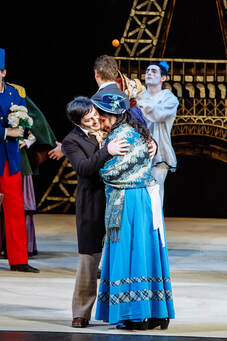
Do you think Rent has opened it up to new audiences?
Yes, I do. I tend to take a musical theatre approach to operas, with lavish visuals, and I get a lot of people coming to the shows who haven’t been to an opera before but they’ve seen big musicals like Miss Saigon or Rent. I firmly believe in opening up opera to the masses.
It will be in Italian with surtitles, rather than in English. Does that reflect the purist in you?
I can’t stand operas in English! I am a purist in that regard, yes. You start putting them into English and the whole sound changes. Puccini, for example, wrote with Italian vowels and when you’re singing you need that Italian in the voice instead of clipped British intonations. And of course surtitles open opera up to the masses and they’re much better than just having a synopsis in the programme. We do that too, but the actual words used are poetic and moving. The librettos are extremely good pieces of writing and you get all this emotion coming out of the words, matched by the emotion coming out of the music. You put those two together and the audience gets a much better experience.
What first sparked your love of opera?
I was born in India to a colonial father and my mother was known as the queen of amateur operatics in Bombay. My mother loved producing and putting on shows - and they were really good, actually. She managed to put me into every single opera from about the age of four. I’d be dressed in these wonderful costumes and I loved it. Then we moved to Spain and we’d go see all the - [laughs] rather bad - travelling operas. That said, from the age of six I declared I wanted to be a film star. Eventually, after my father had retired, I enrolled at Durham University to do a degree in Classics to appease him because he insisted “You’ve got to have some academic education”. I don’t regret doing that degree now because it’s given me a wonderful background for all the operas I’m doing. After I finished my degree I went to the Bristol Old Vic Theatre School, trained as an actress, singer and dancer because although I got a place at the Royal Academy Of Music to go be an opera singer I decided it was too narrow a field.
What happened after you left theatre school?
I went on to acting and musicals and was putting on European children’s theatre when Rochester City Council, who were among the people funding me, asked me to put on a children’s show in Rochester Castle gardens. I don’t know where these notions come from but I found myself saying “I don’t think that’s really suitable but opera might work”. So that’s how it all started, with an outdoor production of Nabucco in 1992 to 7,000 people. I remember the sun sinking over the River Medway with all these people having picnics, we had champagne tents, candelabras, the whole works, and I thought: “This is what I want to do. It’s fantastic. I’m going to do opera.” Since then it’s been a series of wonderful adventures.
I was born in India to a colonial father and my mother was known as the queen of amateur operatics in Bombay. My mother loved producing and putting on shows - and they were really good, actually. She managed to put me into every single opera from about the age of four. I’d be dressed in these wonderful costumes and I loved it. Then we moved to Spain and we’d go see all the - [laughs] rather bad - travelling operas. That said, from the age of six I declared I wanted to be a film star. Eventually, after my father had retired, I enrolled at Durham University to do a degree in Classics to appease him because he insisted “You’ve got to have some academic education”. I don’t regret doing that degree now because it’s given me a wonderful background for all the operas I’m doing. After I finished my degree I went to the Bristol Old Vic Theatre School, trained as an actress, singer and dancer because although I got a place at the Royal Academy Of Music to go be an opera singer I decided it was too narrow a field.
What happened after you left theatre school?
I went on to acting and musicals and was putting on European children’s theatre when Rochester City Council, who were among the people funding me, asked me to put on a children’s show in Rochester Castle gardens. I don’t know where these notions come from but I found myself saying “I don’t think that’s really suitable but opera might work”. So that’s how it all started, with an outdoor production of Nabucco in 1992 to 7,000 people. I remember the sun sinking over the River Medway with all these people having picnics, we had champagne tents, candelabras, the whole works, and I thought: “This is what I want to do. It’s fantastic. I’m going to do opera.” Since then it’s been a series of wonderful adventures.
|
What do you see as the importance of taking opera to regional audiences?
I’m quite an instinctive person so, although I never really thought it through, I just knew audiences in the regions would be hungry for opera. And why go to London when you have these wonderful sites - these outdoor arenas and lovely big theatres - all around the country? I felt that half the population didn’t know how wonderful these works were and I’ve never changed my concept of it. The regions are where these shows need to be. I’ve done the Royal Albert Hall a lot and Leeds Castle, a huge outdoor opera there with a whole horse display in the middle of Carmen, but I do smaller venues too. [Laughs] Not too small, though. Richmond Theatre is probably the smallest house I’ve been to and my sets have to be compressed, like zip files that can be zipped in or spread out. Is it important for you to involve the local community in your operas? I like making everything I do attractive, user-friendly, bring-everybody-in entertainment. When children are written into operas then obviously I need children in them and I always like to use local youngsters whenever I can. I have been using Stagecoach and involving the communities right across Britain and Ireland since 1994, when I first started touring productions. Even the dog in La Bohème comes from the local community. |
This production will be sung in Italian with English surtitles. *Cast Subject to Change.
Tickets available from £29.00. www.thecliffspavilion.co.uk Box Office 01702 351135
Tickets available from £29.00. www.thecliffspavilion.co.uk Box Office 01702 351135
